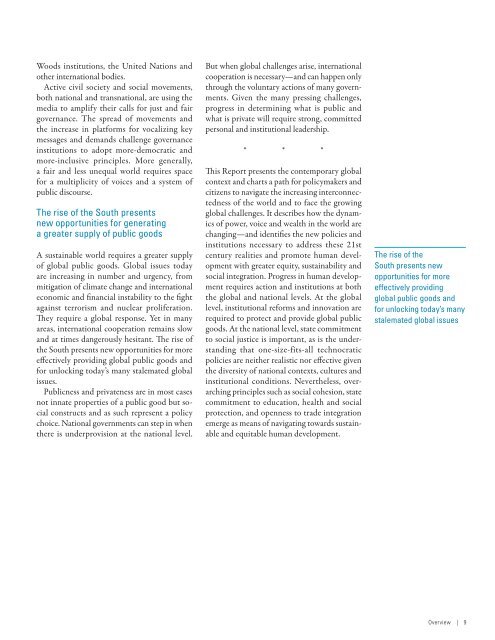E S N W
E S N W
E S N W
You also want an ePaper? Increase the reach of your titles
YUMPU automatically turns print PDFs into web optimized ePapers that Google loves.
Woods institutions, the United Nations and<br />
other international bodies.<br />
Active civil society and social movements,<br />
both national and transnational, are using the<br />
media to amplify their calls for just and fair<br />
governance. The spread of movements and<br />
the increase in platforms for vocalizing key<br />
messages and demands challenge governance<br />
institutions to adopt more-democratic and<br />
more-inclusive principles. More generally,<br />
a fair and less unequal world requires space<br />
for a multiplicity of voices and a system of<br />
public discourse.<br />
The rise of the South presents<br />
new opportunities for generating<br />
a greater supply of public goods<br />
A sustainable world requires a greater supply<br />
of global public goods. Global issues today<br />
are increasing in number and urgency, from<br />
mitigation of climate change and international<br />
economic and financial instability to the fight<br />
against terrorism and nuclear proliferation.<br />
They require a global response. Yet in many<br />
areas, international cooperation remains slow<br />
and at times dangerously hesitant. The rise of<br />
the South presents new opportunities for more<br />
effectively providing global public goods and<br />
for unlocking today’s many stalemated global<br />
issues.<br />
Publicness and privateness are in most cases<br />
not innate properties of a public good but social<br />
constructs and as such represent a policy<br />
choice. National governments can step in when<br />
there is underprovision at the national level.<br />
But when global challenges arise, international<br />
cooperation is necessary—and can happen only<br />
through the voluntary actions of many governments.<br />
Given the many pressing challenges,<br />
progress in determining what is public and<br />
what is private will require strong, committed<br />
personal and institutional leadership.<br />
* * *<br />
This Report presents the contemporary global<br />
context and charts a path for policymakers and<br />
citizens to navigate the increasing interconnectedness<br />
of the world and to face the growing<br />
global challenges. It describes how the dynamics<br />
of power, voice and wealth in the world are<br />
changing—and identifies the new policies and<br />
institutions necessary to address these 21st<br />
century realities and promote human development<br />
with greater equity, sustainability and<br />
social integration. Progress in human development<br />
requires action and institutions at both<br />
the global and national levels. At the global<br />
level, institutional reforms and innovation are<br />
required to protect and provide global public<br />
goods. At the national level, state commitment<br />
to social justice is important, as is the understanding<br />
that one-size-fits-all technocratic<br />
policies are neither realistic nor effective given<br />
the diversity of national contexts, cultures and<br />
institutional conditions. Nevertheless, overarching<br />
principles such as social cohesion, state<br />
commitment to education, health and social<br />
protection, and openness to trade integration<br />
emerge as means of navigating towards sustainable<br />
and equitable human development.<br />
The rise of the<br />
South presents new<br />
opportunities for more<br />
effectively providing<br />
global public goods and<br />
for unlocking today’s many<br />
stalemated global issues<br />
Overview | 9


